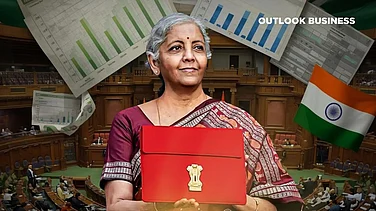The ed-tech sector boomed during the Covid-19 pandemic, receiving $1.88 billion in 2020 alone. However, there was a fall in funding once schools started opening, and the demand for online learning considerably decreased.
Since the start of the ed-tech sector, Byju’s saw a significant fall last year. Other ed-tech companies, such as Lido, Udayy, and Supen Learn, also saw a downfall in 2023. Now, with the budget around the corner, the sector is expecting the government’s help to revive. In an interview with Outlook Business, Anil Nagar, founder and CEO of Adda247, speaks about the sector’s expectations from the budget, the future of the ed-tech sector, and how the government can give a boost to the sector by increasing its funding.
With the Union Budget around the corner, what are your expectations from the ed-tech sector?
The government should focus on empowering educational institutions, including those in the ed-tech sector. While there have been allocations for upskilling and other categories, support for private organizations remains limited.
Providing proper support to private educational institutions will enable them to deliver high-quality education to the masses, benefiting various sectors. This is crucial for increasing tax revenue, as skilling youth will help them enter the workforce and start earning.
The government should encourage and support private sector institutions like ours to be more active in education and training. We serve people in Tier 3 and Tier 4 cities, where high-quality education is scarce. By offering affordable, high-quality education, we significantly reduce costs compared to physical coaching institutes, making education accessible to many more people.
What are your views on the demand of the ed-tech sector for the complete removal of 18 per cent GST?
18 per cent of GST on education should be completely removed. Tech institutions like ours serve people in Tier 3 and Tier 4 towns where high-quality education is scarce. We offer affordable education, reducing costs significantly compared to physical coaching institutes.
The government should appreciate these efforts and reconsider applying GST to our services, as it is not applied to formal education.
Given the ongoing crisis happening with NTA and the stress that students face because of this, what do you think the government should do to mitigate the situation?
Recent events with the NTA, which started with the NEET and expanded to other exams, have led to a decline in trust. Although the government has taken steps like replacing the NTA Chief and setting up inquiries, significant reforms are still needed. Issues this year included sudden changes in exam modes, such as switching CUET and UGC NET exams from online to offline without prior notice.
Unlike other bodies like IBPS that manage exams smoothly, the NTA has apparent gaps in processes, leadership, and transparency. To restore confidence, the NTA must address these issues openly and acknowledge mistakes.
India's ed-tech sector saw a dramatic drop in funding, plunging from $2.9 billion in 2022 to about $712 million in 2023, according to data platform Tracxn. Do you think the scenario will revive for the ed-tech sector?
First of all, there has been a funding decline, but this is not just for ed-tech; it affects all sectors. These funding cycles occur in almost every segment. We saw a peak, and now we are in a downturn.
Ed-tech has been impacted more because some of the bigger companies could not deliver as expected. I believe this is a correction happening in the market. Companies are now refining their models and delivering better results. This should be seen as a correction for the whole ecosystem.
Funding will certainly revive, as it is a cyclical phenomenon with highs and lows. However, the government can intervene and provide some stimulus for VCs to invest more in the country. Incentives like rebates or tax breaks could encourage VCs to invest in India.
Given the recent doubts surrounding high-profile ed-tech companies like Byju’s, how do you foresee the future of the ed-tech sector?
Some business models were flawed and received funding, leading everyone to believe these were the right models. Initially, no one knew what would work, so there was a lot of experimentation.
Every business should address a societal issue. In India, there's a significant gap in quality education, particularly in rural and economically disadvantaged areas.
While the government has made efforts to tackle this, the problem persists. Private companies like ours are working to fill this gap with affordable, high-quality education in local languages.
Comparing this to other companies (Byju’s), some focused on premium segments with high-priced products that were affordable only to a select few. When these products failed, users had offline alternatives. However, the audience we serve often has no offline options. In remote areas, online education is the only viable solution. I believe online education is here to stay and will grow. Eventually, most learning will shift online, and some companies will emerge as major online education providers in India.







.jpg?w=801&auto=format%2Ccompress&fit=max&format=webp&dpr=1.0)
























